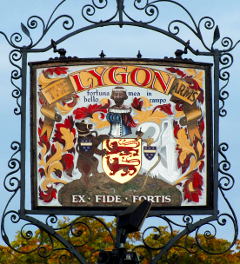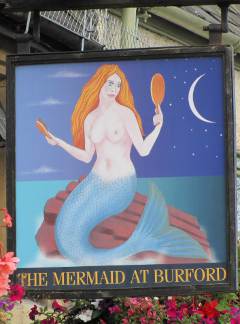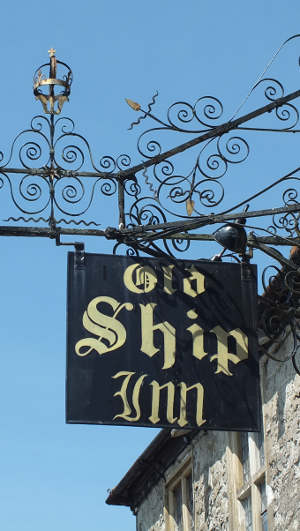About-Britain.com
- a thematic guide to Britain
 Site index
Site index- Essential
information
- Places
to visit
- Attractions
by theme
- Issues
&
institutions
English
Pubs - a lasting tradition
The
Pub is a
traditional part of English life , and even though
in recent years, the steady increase in the price of a "pint " (just
over half a litre of draught beer) has led to a drop in the number of
visits people make to their "local" and the closure of a large number
of pubs across the country , surveys show that two thirds of adults
in Britain visit a pub from time to time, and half of the adult
population
go to the pub on a regular basis.
This
is not surprising. In all societies, places where people can
have
a drink together on "neutral" territory are part of social lifre. They
are places where people go to talk to each other, to find
companionship, to gossip and catch up on news from near and
far .
The French have their cafés, Americans their fast foods, the
English -
and the British Isles in general - their pubs.
The English pub is a place with an important social function - a
meeting place, somewhere to relax, a fairly egalitarian place where
people drink, talk and traditionally play games like cards or darts or
even billiards. Sociological surveys have shown that the pub is the
only place
where the English willingly begin a conversation with a stranger!
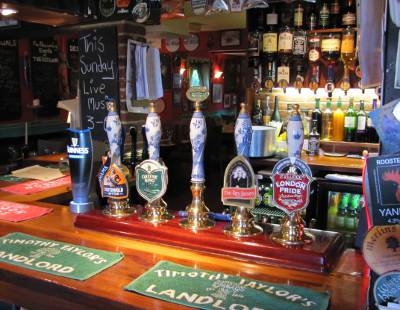
Bar in a
traditional country pub
The
word "
pub"
is short for "public house", i.e. a historic kind of
community centre. In many English pubs, the large majority of consumers
will be people from the neighborhood, the village, or the
parish,
who gather around the bar or table, just like in a episode of the
popular TV
series
Midsomer Murders.
The pub that people visit most regularly is
known as their "local".
There
are many very old pubs in England. The oldest of all, it is said, is a
Nottingham pub called the "
Old
Trippe to Jerusalem " , whose name
dates dates back to the Middle Ages when it was an inn frequented
by Crusaders. Old pubs are mostly in the countryside, or in
historic city centers, and when a pub is not old, the owner (an
independent publican or a brewery) will often make an effort to make it
look older than it really is; beamed ceilings, old oak furniture, soft
lighting.
In
the countryside, many old English pubs are inns or old taverns with a
few bedrooms for travellers, as well as their bars.
Some
traditional
inns with accommodation, in England, Scotland and Wales, are listed in
the iHi
small
Hotel guide.
Every traditional pub is distinguished on the outside by its painted
pub sign indicating and illustrating its name. In the olden days,
illustrated pub signs were vital in order to identify pubs in an age
when most people could not read.
The origins of the
names of pubs in England are sometimes obscure , sometimes related
to history or local specialties . Pubs called "
The King 's Arms"
are often to gbe found in cities or villages which were on the royalist
side
during the Civil War in the 17th century. In London, the name of the
famous pub "
The Elephant
and Castle" is a distorsion of " the Infanta
of Castile ", who was the wife of King Edward 1.
In cities that once prospered from the wool
trade, there are pubs called "
The
Sheep" or "
The
Woolsack", in recognition of the animal that once
underpinned the wealth of the region . With a few modern exceptions,
every pub name tells a story.
Of
course, there are also many "modern" pubs, especially in city centres,
serving a very different and more transient clientele, such as
office-workers, businessmen, passing tourists, or young people
out
for a night out. Depending on the customers they cater for, these will
often have large TV screens to show football matches, karaoke, fruit
machines (slots), music and/or trendy lighting.
Practical : drinking and eating in
English pubs
One thing that often surprises foreign visitors is that in pubs there
is
no table service.
If you go in for a drink, there's no point sitting
round a table near the fire, or outside on a beautiful summer day,
waiting for the bartender to come and take your order. He won't. It's
up to customers, or one of them, to go to the bar, place orders, and
return to the table with the drinks once these have been poured .
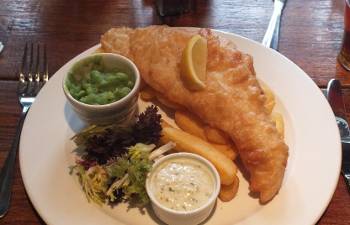
Fish and chips and mushy
peas - a pub favourite
The
same goes for food; if you decide to go for a pub meal, you normally
have to order at the bar, and after that - depending on the pub - you
will be given an order number, or a table number, or, if it's a very
small pub, just remembered by the barman. In some pubs, your meal will
then be brought to your table once it's been prepared; in others,
you'll need to keep listening until someone behind the bar calls out
your number, and you go and pick it up on a tray at from the bar.
Generally speaking, in pubs, food and drink are
paid for upfront, i.e.
when
ordered, not after you have finished. On the other hand,
if you are staying as a guest in an inn, and go for a drink or a meal
in the bar downstairs, you can have it added to your bill.
Ales, beer, lager and other drinks
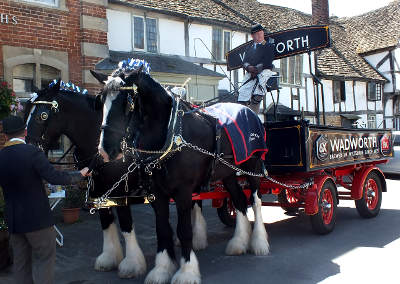
Delivering traditional ale
to a country pub.
While pubs are generally thought of as places where people drink
"beer",
a lot has changed in the last 30 years. Consumption of
international-style industrially produced light beers (called " lager "
in English ) has overtaken that of the traditionally darker or
amber-coloured and less carbonated English ales (often called "bitter "
in
English) . But following the "
real
ales" campaign launched in the 1960s
by a number of micro-breweries, large and medium-sized English
breweries have now improved and adapted their production, and gone
back to producing traditional naturally-fermented ales, often
unpasteurized and without any added CO².
Today, most pubs offer draught "real ales",
alongside
other beers and lagers with well-known brand names,
industrially
produced by large multinational brewing corporations.
For the authentic pub experience, visitors should
ask the barman for a good locally produced "real ale".
Here are the names of a few "real ales " often found in the south of
England :
Abbot Ale,
London Pride, Theakstones, Old Speckled Hen,
Breakspeare , Greene King IPA (IPA = India Pale Ale ,
formerly the best
beers exported to the colonies )
Spitfire,
Adnams , etc.
Ordering:
If you want to drink a normal sized glass of beer (around 250
millilitres), ask for a "half": this is half a pint. The
English
usually order " a pint " at a time. Note that people never just order "
a beer"
in an English pub; the tradition is to indicate both the volume (half
pint or pint) and the specifric beer you want. So if you're ordering
for two people, you may say something like "
A pint of Theakestones and
a half of Heineken, please . " The "please " at the end is
a must!
Finally, it is worth remembering that pubs do not only serve
beer
! You can order almost anything you want to drink, in terms o
f cold
alcoholic or non-alcoholic beverages . Some pubs - including those
serving food - also offer coffee, usually a long coffee in English ,
rather than espresso; but do not go to a pub if you want a cup of tea !
For this there are cafés, restuarants and tea rooms (which
do not serve
alcoholic drinks).
PS: A Word of Warning
It is advisable to
avoid pubs in the center of some cities (and towns) on Friday night and
Saturday night. Prefer a pub in a suburb, or in the country. Friday and
Saturday nights are weekend evenings, when lots of people like to let
off steam, particularly young people.
"Binge drinking" has
become a serious social problem in some city centres, where, on Friday
and Saturday nights, young people swarm into bars with little other
intention than to drink the night away, and get drunk. It is
a
social phenomenon common in England, but not exclusive to the British
Isles.
British police often work hard on Friday
and Saturday night to control
youth gangs roaming the streets, having obviously drunk
too much, and sometimes seeking nothing better than a brawl.







